Research Roundup highlights the work of faculty in the Division of Social Sciences. For ongoing coverage of UCSC research, please visit the UCSC Newscenter and Social Sciences News.
Anthropology
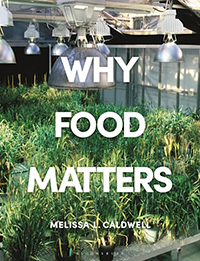 Professor Melissa Caldwell edited the anthology Why Food Matters: Critical Debates in Food Studies (Bloomsbury). This book brings together innovative scholarship through global case studies and debates to provide an introduction to the rapidly growing discipline of food studies. Chapter topics include molecular gastronomy, lab-grown meat and other futurist foods, microbiopolitics, healthism and nutritionism, food safety, ethics, animal welfare, fair trade, among others. With a wide range of theoretical perspectives and disciplinary approaches, it challenges common ideas about food and identifies emerging trends that define the field.
Professor Melissa Caldwell edited the anthology Why Food Matters: Critical Debates in Food Studies (Bloomsbury). This book brings together innovative scholarship through global case studies and debates to provide an introduction to the rapidly growing discipline of food studies. Chapter topics include molecular gastronomy, lab-grown meat and other futurist foods, microbiopolitics, healthism and nutritionism, food safety, ethics, animal welfare, fair trade, among others. With a wide range of theoretical perspectives and disciplinary approaches, it challenges common ideas about food and identifies emerging trends that define the field.
Professor Nancy Chen delivered a TED Salon talk, The inaccurate link between body ideals and health, that as of this publication date has been viewed nearly 1.5 million times online and translated into 10 languages. Her work, and the TED talk, was featured in the UCSC News.
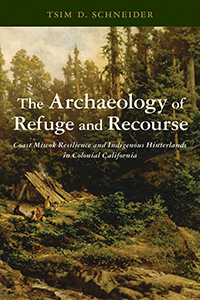 Assistant Professor Tsim Schneider, published The Archaeology of Refuge and Recourse: Coast Miwok Resilience and Indigenous Hinterlands in Colonial California (University of Arizona Press), which explores the dual practices of refuge and recourse among Indigenous peoples of California. From the eighteenth to twentieth centuries, Indigenous Coast Miwok communities in California persisted—their cultures transformed and stayed the same—throughout multiple waves of colonial intrusion. But, to what ends? Applying theories of place and landscape, social memory, and mobility to the analysis of six archaeological sites, Assistant Professor Schneider argues for a new direction in the archaeology of colonialism that attends to the critical and ongoing relationships Native people maintained to their homelands despite the impacts of colonization and the systematic destruction of cultural sites. Fleeing colonial missions and other establishments and taking refuge around the San Francisco Bay Area, Coast Miwok people sought to protect their identities by remaining connected to culturally and historically significant places such as ancient shellmounds. Mobility and a sense of place further enabled Coast Miwok people to find recourse and make decisions about their future through selective participation in assorted colonial projects. These distancing and familiarizing efforts, Schneider argues, contribute to the resilience of Coast Miwok communities and a sense of relevance and belonging to stolen lands and waters. Assistant Professor Schneider’s book was highlighted in the UCSC News.
Assistant Professor Tsim Schneider, published The Archaeology of Refuge and Recourse: Coast Miwok Resilience and Indigenous Hinterlands in Colonial California (University of Arizona Press), which explores the dual practices of refuge and recourse among Indigenous peoples of California. From the eighteenth to twentieth centuries, Indigenous Coast Miwok communities in California persisted—their cultures transformed and stayed the same—throughout multiple waves of colonial intrusion. But, to what ends? Applying theories of place and landscape, social memory, and mobility to the analysis of six archaeological sites, Assistant Professor Schneider argues for a new direction in the archaeology of colonialism that attends to the critical and ongoing relationships Native people maintained to their homelands despite the impacts of colonization and the systematic destruction of cultural sites. Fleeing colonial missions and other establishments and taking refuge around the San Francisco Bay Area, Coast Miwok people sought to protect their identities by remaining connected to culturally and historically significant places such as ancient shellmounds. Mobility and a sense of place further enabled Coast Miwok people to find recourse and make decisions about their future through selective participation in assorted colonial projects. These distancing and familiarizing efforts, Schneider argues, contribute to the resilience of Coast Miwok communities and a sense of relevance and belonging to stolen lands and waters. Assistant Professor Schneider’s book was highlighted in the UCSC News.
Division of Social Sciences
Professor Julie Guthman published Socioeconomic challenges of California strawberry production and disease resistant cultivars in Frontiers in Sustainable Food Systems. Her co-author Estéli Jiménez-Soto is a former post-doc at UCSC who worked as a social scientist on a USDA-funded Specialty Crop Research Initiative (awarded to UC Davis), seeking to identify natural sources of resistance to pathogens affecting strawberries and accelerate the development of such cultivars. Building on Professor Guthman's prior research on strawberries, the authors studied how the interrelated challenges of land prices, labor shortages, marketing standards, and low prices in particularly bear on cultivar selection. The paper corroborates that strawberry growers operate under significant socioeconomic constraints in California, many of which are beyond their control. They also found that most growers see high-yielding varieties as crucial to their economic viability with regard to land, labor, and marketing intermediaries and yet recognize that the focus on individual farm productivity works at cross purposes to the problem of poor prices. As such, disease resistant varieties do not at face value address the concerns voiced by most growers. Their findings suggest that if some of the other pressures were exogenously mitigated, growers might be more inclined to experiment with and adopt disease resistant varieties, in combination with other approaches.
Professor Guthman also has an article coming out in early 2022 for Environmental Humanities. Titled "The CAFO in the bioreactor: reflections on efficiency logics in bio-industrialization present and future", the paper was animated by a 2020 report published by the think tank RethinkX which predicts the “second domestication of plants and animals, the disruption of the cow, and the collapse of industrial livestock farming” by the year 2035. In one sense typical of the promissory discourses circulating about the future of food, the report is otherwise unusual in its focus on the gains of efficiency and near limitless growth that will come by eradicating confined livestock and aquaculture operations and replacing them with protein engineered by scientists at a molecular level and fermented in bioreactors. While there are many reasons to disrupt industrialized livestock production, their lack of efficiency is arguably not one of them. My essay thus examines to what extent this so-called second domestication differs from the radical transformations of animal biologies and living conditions – or bio-industrialization – to which it responds, arguing that while a “second domestication” might entail less harm to sentient animals, which is no small thing, the underlying logic of efficiency is neither novel nor necessarily beneficent.
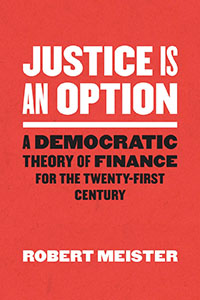 Professor Bob Meister published Justice Is an Option: A Democratic Theory of Finance for the Twenty-First Century (University of Chicago Press). In his more recent book, Professor Meister formulates a democratic financial theory for the twenty-first century that draws upon political philosophy, Marxism, and contemporary politics in order to explore whether the tools of finance that have created a vastly unequal world could instead be made to serve justice and equality.
Professor Bob Meister published Justice Is an Option: A Democratic Theory of Finance for the Twenty-First Century (University of Chicago Press). In his more recent book, Professor Meister formulates a democratic financial theory for the twenty-first century that draws upon political philosophy, Marxism, and contemporary politics in order to explore whether the tools of finance that have created a vastly unequal world could instead be made to serve justice and equality.
Economics
Professor Rob Fairlie recently received the Bradford-Osborne Research Award, which recognizes ground-breaking research in support of entrepreneurs of color. He was honored for his August 2020 paper in the Journal of Economics and Management Strategy, The impact of COVID-19 on small business owners: Evidence from the first three months after widespread social-distancing restrictions. The recognition was featured in the UCSC News.
Professor Galina Hale published a paper in the prestigious Journal of Finance. In this paper, Stock Market Spillovers via the Global Production Network: Transmission of U.S. Monetary Policy, the authors show that international trade linkages, that is, international trade in consumption goods, capital goods, and components used in production, also contribute to the transmission of financial shocks from the U.S. to stock prices in other countries. This is an important finding because it sheds light on how asset markets in different countries are interconnected. For more information, a blog post on the paper was published by Professor Hale’s coauthor on this paper, Julian di Giovanni, of the Federal Reserve Bank of New York.
Professor Hale also published a related piece for Econofact, How Economic Crises Spread Abroad in which she discusses how the COVID-19 pandemic demonstrates in a particularly stark way how the world is interconnected with respect to the transmission of disease and that there can also be implications of global interconnectedness with respect to acute economic maladies. Countries benefit from increasing international trade and financial flows, but interconnectedness can make them vulnerable to economic shocks originating abroad
Associate Professor Ajay Shenoy has a forthcoming article on the impact of early social distancing, God is in the Rain: The Impact of Rainfall-Induced Early Social Distancing on COVID-19 Outbreaks, in the Journal of Health Economics. Early adopters of COVID-19 mandatory restrictions among local governments had smaller outbreaks in the initial phase of the pandemic, but lockdowns and other less extreme measures generated enormous controversy due to economic costs. The authors measured the benefit to society created by preventing COVID-19 deaths through a marginal increase in early social distancing by exploiting county-level rainfall on the last weekend (the last day that people had wide discretion in leaving home for reasons unrelated to work) before statewide lockdown in the early phase of the pandemic. After controlling for historical rainfall, temperature, and state fixed-effects, current rainfall is a plausibly exogenous instrument for social distancing. The authors find large social benefits from earlier distancing. A one percent decrease in the population leaving home on the weekend before lockdown averts 1.5 deaths per 100k residents within 2 weeks, a social benefit equal to 132 dollars per county resident. The impacts of earlier distancing compound over time and mainly arise from lowering the risk of a major outbreak, yielding large but unevenly distributed social benefit.
Professor Nirvikar Singh published several papers since July, including Environmental Issues, Economic Policies and Agricultural Development: The Case of Punjab, India, with Rongchen Liu and Anirban Sanyal. This paper, published in in Indian Public Policy Review, discusses economic policies that have supported a particular kind of agricultural development in Punjab, as well as environment-specific policies, that have sought to deal with various environmental problems arising from that pattern of development. In doing so, we highlight some major environmental issues associated with economic policies in the state, including with respect to water, air, soil and climate change. The authors analyze why and how economic policy failures, including at the national level, adversely affect environmental quality in Punjab. The aim of the paper is to highlight these issues, as a first step towards identifying policies that may do a better job of protecting the environment.
Professor Singh also published, with Anirban Sanyal, Structural Change and Economic Growth: Patterns and Heterogeneity among Indian States and Implications for a Post-COVID Recovery, in India Policy Forum. This paper empirically examines the relationship between economic growth and structural change in India over recent decades. It first estimates panel regressions with state-level data to examine the impact of structural change on growth and vice versa. Bidirectional causality is found, which holds across different specifications and estimation methods: each variable positively impacts the other in a positive feedback loop. The second part of the analysis relaxes assumptions of constant impacts across states and over time, estimating time-varying autoregressive models for each state and each pair of variables. The impacts of structural change and growth on each other seem to vary across different states, as well as over time, and are differentially affected by state per capita income levels and national growth rates. Similar variability across states and over time is found in an alternative method: labor productivity decompositions using employment data. Some possible reasons for these differences are discussed. The analysis suggests that national economic policy formulation may benefit from closer consideration of the structural differences across states, and the resulting differences in growth responses. The paper concludes with some possible implications for India’s post-pandemic recovery.
Finally, Professor Singh published Structural change and economic growth in India: a comparative study of Punjab (with Anirban Sanyal), in Indian Growth and Development Review. The Green Revolution transformed agriculture in the Indian State of Punjab, with positive spillovers to the rest of India, but recently the state’s economy has fallen dramatically in rankings of per capita state output. Understanding the trajectory of Punjab’s economy has important lessons for all of India. Economic development is typically associated with changes in economic structure, but Punjab has remained relatively reliant on agriculture rather than shifting economic activity to manufacturing and services, where productivity growth might be greater. Panel regressions and time-varying-coefficient regressions suggest a significant positive influence of structural change on state-level growth. In addition, growth positively affected structural change across India’s states. The relative lack of structural change in Punjab’s economy is implicated in its relatively poor recent growth performance. Comparisons with a handful of other states reinforce this conclusion: Punjab’s lack of economic diversification is a plausible explanation for its lagging economic performance.
Education
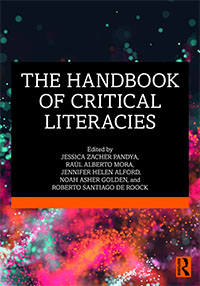 Assistant Professor Roberto de Roock co-edited The Handbook of Critical Literacies (Routledge), which addresses the social responsibilities of critical literacy academics, researchers, and teachers in today’s world. Organized into thematic and regional sections, the Handbook provides substantive definitions of critical literacies across fields and geographies, surveys of critical literacy work in over 23 countries and regions, and overviews of research, practice, and conceptual connections to established and emerging theoretical frameworks. The chapters on global critical literacy practices include research on language acquisition, the teaching of literature and English language arts, Youth Participatory Action Research, environmental justice movements, among other topics, designed to enable researchers to position their studies within relevant directions in the field and engage, organize, disrupt, and build towards more sustainable social and material relations.
Assistant Professor Roberto de Roock co-edited The Handbook of Critical Literacies (Routledge), which addresses the social responsibilities of critical literacy academics, researchers, and teachers in today’s world. Organized into thematic and regional sections, the Handbook provides substantive definitions of critical literacies across fields and geographies, surveys of critical literacy work in over 23 countries and regions, and overviews of research, practice, and conceptual connections to established and emerging theoretical frameworks. The chapters on global critical literacy practices include research on language acquisition, the teaching of literature and English language arts, Youth Participatory Action Research, environmental justice movements, among other topics, designed to enable researchers to position their studies within relevant directions in the field and engage, organize, disrupt, and build towards more sustainable social and material relations.
Professor Judit Moschkovich published a co-authored article in Educational Studies in Mathematics, Tales from three countries: Reflections during Covid-19 for mathematics education in the future. In this article, the authors investigate how school mathematics can prepare citizens for a democratic society through the lens of the SARS-CoV-2 pandemic with its corresponding disease COVID-19. Using three narratives from three countries—Italy, the USA (California), and Germany—the authors reflect on the goals of teaching mathematics during this crisis and examine aspects of each country’s standards for mathematics education. They then examine common issues that might provide insights beyond this current crisis, for preparing students to become active citizens. In particular, they focus on three issues: (1) developing a positive mindset toward mathematics to engage with and reflect on real-world problems, (2) improving interdisciplinary connections to the sciences to better understand how science professional practices and insights are similar or different from everyday practices, and (3) considering interpersonal and collective matters beyond the individual.
Professor Moschkovich also published an article in the Danish journal, Videm on Literacy, Language and learning mathematics: A sociocultural approach to academic literacy in mathematics, which summarizes her work on language and learning mathematics and provides an integrated framework of academic literacy in mathematics, which can be used to analyze students’ oral or written contributions, or to review, design, or supplement mathematical tasks for attention to language.
In November 2021, Professor Moschkovich presented an invited talk (online) for the CSU California State University Math and Math Education Colloquium Series: Developing an Access- and Equity-Oriented Mindset in Mathematics Teaching and Learning, titled “Language and learning mathematics: A socio-cultural approach to academic literacy in mathematics.”
Assistant Professor Josephine H. Pham published Teacher Leadership for Love, Solidarity, and Justice: The Invisibilized and Contested Practices of Teacher Leaders of Color in the Journal of Teacher Education. The article discusses the possibilities and contradictions of teacher leadership that advance educational opportunities for K-12 students of color yet are often unrecognized in institutional settings. By looking closely at the micro-level practices of teacher leaders of color, she argues that a more collective, situated, and critical framework of leadership is needed to identify and sustain racial justice initiatives.
Environmental Studies
Profesor Flora Lu, Michael S. Esbach, and Felipe Borman Quenama published Conservation and Care among the Cofán in the Ecuadorian Amazon in the journal Conservation and Society. In this article, the authors examine the dire threats to the Amazonian biome and its inhabitants caused by accelerating deforestation and degradation linked to political and economic policies and agendas that endanger the health, well-being, and cultural survival of Indigenous people. Tackling these challenges necessitates a unified response by local and global partners. However, some conservationists, predominantly from the Global North, have perpetuated problematic, essentialized framings of Indigenous communities, which have even led them to advocate for morally and conceptually flawed, punitive protectionist policies. As a Western construct, conservation—and the protected areas that are centered in its enactments—are problematically treated as an unalloyed, universal good. In this paper, The authors argue for a more pluralistic approach, one that calls for equal footing between Indigenous and sustainability science. They examine a case study of the Cofán community of Zábalo in the Ecuadorian Amazon, where collective efforts to tsampima coiraye (care for the forest) have resulted in dynamic institutions adapted to diverse challenges and opportunities. Tsampima coiraye exemplifies a form of caretaking that is distinct from and complementary to Western conservation, one that provides important insights into understanding the context and meanings through which community governance fosters stewardship. They draw upon longitudinal ethnographic fieldwork and the concept of puifama atesuye (Two-World Knowledge) to describe Cofán collective action, community governance, and caretaking.
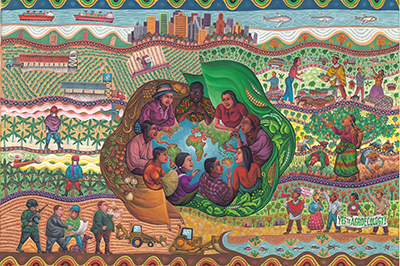 Assistant Professor Maywa Montenegro de Wit co-edited a special issue of the journal Development about the UN Food Systems Summit. Her two contributions included the framing paper, Resetting Power in Global Food Governance: The UN Food Systems Summit, and Woke Science and the Fourth Industrial Revolution, a paper co-authored with UC Berkeley professor Alastair Iles. The framing paper lays the groundwork for understanding the politics of the UNFSS and what it augurs for future global food governance. It examines the discourses and practices through which powerful actors are seeking to reframe food system governance, the shifting institutional arrangements emerging from the Summit, and what this means for control over the multiplicity of food systems globally. The “Woke Science…” paper, in turn, argues that science, technology, and innovation offer particularly salient insights into Summit processes, including how dominant actors in global food policy continually rework their power and legitimacy. Focusing on discourses and material networks, the article demonstrates that the Scientific Group makes appeals to inclusivity—of people of color, women, youth, smallholders, and more—while extending old Green Revolution ideas through new 4th Industrial Revolution innovations and governance ambitions. Artwork by BoyD Dominguez.
Assistant Professor Maywa Montenegro de Wit co-edited a special issue of the journal Development about the UN Food Systems Summit. Her two contributions included the framing paper, Resetting Power in Global Food Governance: The UN Food Systems Summit, and Woke Science and the Fourth Industrial Revolution, a paper co-authored with UC Berkeley professor Alastair Iles. The framing paper lays the groundwork for understanding the politics of the UNFSS and what it augurs for future global food governance. It examines the discourses and practices through which powerful actors are seeking to reframe food system governance, the shifting institutional arrangements emerging from the Summit, and what this means for control over the multiplicity of food systems globally. The “Woke Science…” paper, in turn, argues that science, technology, and innovation offer particularly salient insights into Summit processes, including how dominant actors in global food policy continually rework their power and legitimacy. Focusing on discourses and material networks, the article demonstrates that the Scientific Group makes appeals to inclusivity—of people of color, women, youth, smallholders, and more—while extending old Green Revolution ideas through new 4th Industrial Revolution innovations and governance ambitions. Artwork by BoyD Dominguez.
Assistant Professor Montenegro also published Can Agroecology and CRISPR Mix? The politics of complementarity and moving toward technology sovereignty in the journal Agriculture and Human Values. This article addresses the question of combining agroecology with new biotechnologies such as CRISPR by exploring dimensions of (1) technological neutrality, (2) “root cause” problems, (3) working with nature, (4) encoding racism, and dilemmas of (5) ownership and (6) access. These questions, Montenegro argues, require a reckoning with (7) ontologies of coloniality-modernity. The paper concludes with a novel framework for thinking about and working toward technology sovereignty.
Finally, with SESYNC collaborators, Assistant Professor Montenegro launched a call for papers in a new special feature in the UC Press journal Elementa: Agrobiodiversity Nourishes Us/La Agrobiodiversidad Nos Nutre: Action Research for Agroecological Transformations. Please consider contributing and/or sharing with your networks!
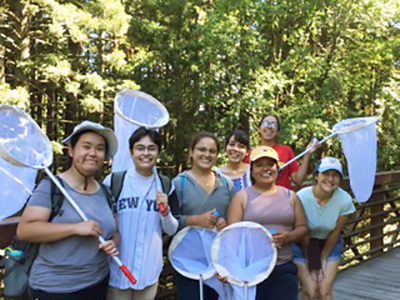 Professor Stacy Philpott and members of the Biodiversity of Urban Gardens or “BUGS” team were thrilled to resume field work during the summer of 2021, funded by a new USDA-NIFA grant awarded in 2020. Philpott and co-PI’s are studying Ecological networks, management shifts, and ecosystem services In urban agricultural landscapes. The team, including undergraduates, graduate students, a postdoc, and a research specialist visited 23 urban gardens in the California Central Coast between June - September. They characterized the local management of the gardens (e.g., crop and ornamental plant selection and diversity, floral abundance, detailed information on plant traits, use of soil amendments or ground covers), as well as the landscape surroundings (e.g., amount of natural, urban, and agricultural habitat nearby). This summer, they surveyed pollinators, took careful notes of what plants pollinators were visiting, and will also extract pollen from insect bodies to construct interaction networks across the range of gardens sampled. The overall aims of the project are to: 1) determine how local garden management and landscape filters influence (a) functional traits of plants, pollinators, and natural enemies, (b) ecological networks, and (c) pest control, pollination, and crop production services; 2) investigate how management changes (e.g., flower or mulch addition) shift species traits and network structure and determine how to design management to boost pest control, pollination, and crop production; and 3) understand how gardener perceptions influence the potential for implementing management changes that promote ecosystem services.
Professor Stacy Philpott and members of the Biodiversity of Urban Gardens or “BUGS” team were thrilled to resume field work during the summer of 2021, funded by a new USDA-NIFA grant awarded in 2020. Philpott and co-PI’s are studying Ecological networks, management shifts, and ecosystem services In urban agricultural landscapes. The team, including undergraduates, graduate students, a postdoc, and a research specialist visited 23 urban gardens in the California Central Coast between June - September. They characterized the local management of the gardens (e.g., crop and ornamental plant selection and diversity, floral abundance, detailed information on plant traits, use of soil amendments or ground covers), as well as the landscape surroundings (e.g., amount of natural, urban, and agricultural habitat nearby). This summer, they surveyed pollinators, took careful notes of what plants pollinators were visiting, and will also extract pollen from insect bodies to construct interaction networks across the range of gardens sampled. The overall aims of the project are to: 1) determine how local garden management and landscape filters influence (a) functional traits of plants, pollinators, and natural enemies, (b) ecological networks, and (c) pest control, pollination, and crop production services; 2) investigate how management changes (e.g., flower or mulch addition) shift species traits and network structure and determine how to design management to boost pest control, pollination, and crop production; and 3) understand how gardener perceptions influence the potential for implementing management changes that promote ecosystem services.
Pictured are (from L to R) BUGS Team members Jenny Hsu (EEB undergrad, SUPERDAR Scholar), Robyn Fowler (ENVS undergrad, SUPERDAR Scholar), Sofie Andrade (EEB undergrad, CAMINO Scholar), Azucena Lucatero (ENVS PhD student), Edith Gonzales (ENVS PhD student), Genesis Perez (Inter American University of Puerto Rico undergrad, Doris Duke Conservation Scholar), and Gabriella Pardee (U. of Texas postdoctoral researcher).
Associate Professor Kai Zhu published Widespread Mismatch Between Phenology and Climate in Human-Dominated Landscapes in the journal AGU Advances. Plants are expected to track warming climate partly by shifting their phenology, the timing of recurring biological events. Despite numerous reports on phenological shifts driven by climate change, it is unknown whether these observed shifts are sufficient to keep pace with rapid warming trends at large spatial scales. It is even less clear how human activities contribute to the emergent climate-phenology mismatch. Using global remote sensing data, the authors employed a novel approach to systematically evaluate how plant phenological shifts have kept pace with warming trends at a continental scale. They found a net lag between phenological shift and climate change, which increases with population density, suggesting a relationship between human activities and the decoupling of phenology dynamics and climate variation. Results were corroborated with independent ground observations that show how the mismatch of spring phenology increases with human population density for several plant species. This systematic analysis of climate-phenology mismatch informs the sustainable management of vegetation in human-dominated landscapes under climate change. This study was also featured in the UCSC News.
Latin America and Latino Studies
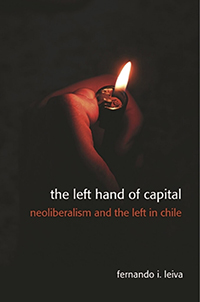 Professor Fernando Leiva published The Left Hand of Capital: Neoliberalism and the Left in Chile (SUNY Press). In his book, Professor Leiva provides a theoretically grounded analysis of the last thirty years of socioeconomic policies in Chile, beginning at the end of the Pinochet military regime in 1990. He skillfully probes how innovative center-left politico-economic initiatives transformed the state’s relationships with the country’s urban poor, indigenous peoples, workers, students, and business elites, thereby contributing to institutionalize, legitimize, and renew Chile’s neoliberal system of domination. Leiva documents how such politics, progressive in appearance, were pivotal in forging new arts of domestication, “participatory” social control mechanisms, and commodified subjectivities. This landmark book guides us into a deeper awareness about the limitations of center-left politics, not only in Chile, but elsewhere in the Americas and Western Europe as well. At a time when far-right movements seem to be growing in the Global South, Europe, and the United States, this book offers valuable insights into the predicament of social democracy and how, as in Chile and in the context of global neoliberalism, it can become the “left hand of capital.”
Professor Fernando Leiva published The Left Hand of Capital: Neoliberalism and the Left in Chile (SUNY Press). In his book, Professor Leiva provides a theoretically grounded analysis of the last thirty years of socioeconomic policies in Chile, beginning at the end of the Pinochet military regime in 1990. He skillfully probes how innovative center-left politico-economic initiatives transformed the state’s relationships with the country’s urban poor, indigenous peoples, workers, students, and business elites, thereby contributing to institutionalize, legitimize, and renew Chile’s neoliberal system of domination. Leiva documents how such politics, progressive in appearance, were pivotal in forging new arts of domestication, “participatory” social control mechanisms, and commodified subjectivities. This landmark book guides us into a deeper awareness about the limitations of center-left politics, not only in Chile, but elsewhere in the Americas and Western Europe as well. At a time when far-right movements seem to be growing in the Global South, Europe, and the United States, this book offers valuable insights into the predicament of social democracy and how, as in Chile and in the context of global neoliberalism, it can become the “left hand of capital.”
Associate Professor Patricia Pinho published an article in the Italian journal Confluenze: Rivista di Istudi IberoAmericani, special issue "Divided Brazil: The Effects of Bolsonaro's Election and Government.” The paper, A Casa Grande Surta Quando a Senzala Aprende a Ler: Resistência Antirracista e o Desvendamento da Branquitude Injuriada no Brasil, examines the use of the expression “the slave masters freak out when the slaves learn to read” and the “casa grande & senzala” dyad as a strategy of anti-racist resistance in contemporary Brazil. The dyad and the expression have been mobilized to challenge the increasingly racist and reactionary rhetoric of the Brazilian traditional middle-class that refuses to let go of the privileges it has historically accrued. The enunciation of these idioms contributes to the unveiling of an “injured whiteness” that emerged in reaction to the Workers’ Party’s administrations (2003-2016).
Associate Professor Pinho also published a book chapter in Precarious Democracy: Ethnographies of Hope, Despair, and Resistance in Brazil (Rutgers University Press). Entitled “Whiteness Has Come Out of the Closet and Intensified Brazil’s Reactionary Wave,” the chapter analyzes the significance of whiteness in informing and inciting Brazil’s reactionary wave and the election of Bolsonaro. The examination of whiteness allows for a deeper understanding of what have been defined as the major propellers for the rise of the right in Brazil (class resentment, racism, sexism, homophobia, and religious fundamentalism), and it also reveals how they intersect with and mutually support one another. Pinho analyzes whiteness not only as a social identity and a social practice, but also as an ideal promoted discursively as a major social value to be preserved, by those who already possess it, or acquired, by those who do not. She offers the concepts of “injured whiteness” and “aspirational whiteness" in order to understand how the appeal of whiteness operates across social classes and racial groups.
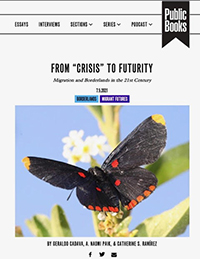 Professor Catherine Ramírez published A Beacon of Futurity and a Balm of Security in Public Books. This essay, on essential undocumented workers and the healing power of art during the pandemic, rounded out From ‘Crisis’ to Futurity: Migration and Borderlands in the 21st Century, a series of essays offering vital historical context, urgent political critique, and an expansive understanding of all the aspects of life in the United States that immigration affects published by Public Books in the summer of 2021.
Professor Catherine Ramírez published A Beacon of Futurity and a Balm of Security in Public Books. This essay, on essential undocumented workers and the healing power of art during the pandemic, rounded out From ‘Crisis’ to Futurity: Migration and Borderlands in the 21st Century, a series of essays offering vital historical context, urgent political critique, and an expansive understanding of all the aspects of life in the United States that immigration affects published by Public Books in the summer of 2021.
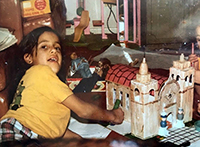 Professor Ramírez also published The Other Southland: Missions, Monuments, and Memory in Tovaangar, in Boom California. The essay was written in response to being asked to provide a “Latinx response" to conversations about white supremacist monuments in the US. Around the time that she received this invitation, there was a fire (which turned out to be arson) at Mission San Gabriel where, growing up, Professor Ramírez attended masses and graduated from the high school. Both the mission and the fire prompted her to rethink the many forms that white supremacist monuments take, even and especially beyond the American South.
Professor Ramírez also published The Other Southland: Missions, Monuments, and Memory in Tovaangar, in Boom California. The essay was written in response to being asked to provide a “Latinx response" to conversations about white supremacist monuments in the US. Around the time that she received this invitation, there was a fire (which turned out to be arson) at Mission San Gabriel where, growing up, Professor Ramírez attended masses and graduated from the high school. Both the mission and the fire prompted her to rethink the many forms that white supremacist monuments take, even and especially beyond the American South.
Finally, Professor Ramírez’s book, Assimilation: An Alternative History (University of California Press), has received the Honorable Mention for the 2019-20 Modern Language Association Prize in United States Latina and Latino and Chicana and Chicano Literary and Cultural Studies.
Politics
Associate Professor Sara Niedzwiecki published a co-authored article with Prof. Agustina Giraudy from American University in Regional & Federal Studies. Multi-level governance and subnational research: Similarities, differences, and knowledge accumulation in the study of territorial politics studies two research programs that have tackled crucial questions in comparative politics such as how power is distributed across levels of government, the causes of uneven territorial development, or why democracy trickles down unevenly within countries. Despite their shared principle that actors and institutions located at one territorial level are shaped by and shape other levels of government, Multi-level Governance and Subnational Research traditions have developed their own set of concepts and theories without fully acknowledging the other. The authors believe that this has been detrimental for knowledge accumulation. They argue that more knowledge accumulation in the study of territorial politics is possible if (1) scholars engage with each tradition, and (2) they are attentive to differences, or blind spots, in each traditions’ theories, concepts, and scope conditions. Drawing on two examples, the Regional Authority Index (RAI) and Kent Eaton’s work (2021) the article shows the benefits of transcending the boundaries of each tradition.
Associate Professor Niedzwiecki also received the 2021 Kendra Koivu Paper Award from the American Political Science Association's Qualitative and Multi-Method Research Section, for the Best Paper presented at the 2020 Annual Meeting developing and/or applying qualitative research methods. The paper is co-authored with Prof. Jennifer Pribble from the University of Richmond and is entitled “Reconceptualizing Social Policy Expansion and Retrenchment: South America after the Commodity Boom.”
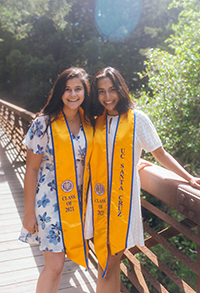 Professor Matt Sparke co-authored Sharing the burden of treatment navigation: social work and the experiences of unhoused women in accessing health services in Santa Cruz with recently graduated UCSC undergrads Aarushi Saharan and Manya Balachander (shown in picture). The paper explores the challenges faced by unhoused women in accessing general and reproductive health care services in Santa Cruz, CA. Semi-structured interviews with women experiencing houselessness were conducted in Santa Cruz, CA with a focus on their narrative experiences as patients. The overwhelming majority of participants expressed appreciation for clinics that provided support through longer hours, alternative therapies, and appointment reminders. Overall, the interviews indicated that women who had access to a social worker were much more likely to report improved access to satisfactory treatment. These findings suggest that there is not a tangible lack of healthcare services for unhoused women in the local community, but rather a burden of treatment navigation caused by a dearth of information on how to access care. The interviews suggest that this burden can be reduced with social work interventions and service centers that offer health navigation support. By adapting theories of the “burden of treatment,” the authors argue that additional attention must be paid to overcoming the “burden of treatment navigation.” For related reasons, they suggest that increasing the availability of social workers would concretely improve health outcomes for unhoused women.
Professor Matt Sparke co-authored Sharing the burden of treatment navigation: social work and the experiences of unhoused women in accessing health services in Santa Cruz with recently graduated UCSC undergrads Aarushi Saharan and Manya Balachander (shown in picture). The paper explores the challenges faced by unhoused women in accessing general and reproductive health care services in Santa Cruz, CA. Semi-structured interviews with women experiencing houselessness were conducted in Santa Cruz, CA with a focus on their narrative experiences as patients. The overwhelming majority of participants expressed appreciation for clinics that provided support through longer hours, alternative therapies, and appointment reminders. Overall, the interviews indicated that women who had access to a social worker were much more likely to report improved access to satisfactory treatment. These findings suggest that there is not a tangible lack of healthcare services for unhoused women in the local community, but rather a burden of treatment navigation caused by a dearth of information on how to access care. The interviews suggest that this burden can be reduced with social work interventions and service centers that offer health navigation support. By adapting theories of the “burden of treatment,” the authors argue that additional attention must be paid to overcoming the “burden of treatment navigation.” For related reasons, they suggest that increasing the availability of social workers would concretely improve health outcomes for unhoused women.
Professor Sparke also published a paper, coauthored with health policy research Owain Williams, titled Neoliberal disease: COVID-19, co-pathogenesis and global health insecurities. In this paper, the authors discuss how the COVID-19 pandemic has exposed, exploited and exacerbated the health-damaging transformations in world order tied to neoliberal globalization. Their central argument is that the same neoliberal plans, policies and practices advanced globally in the name of promoting wealth have proved disastrous in terms of protecting health in the context of the pandemic via a cascade of socio-viral co-pathogenesis that they term neoliberal disease. From the vectors of vulnerability created by unequal and unstable market societies, to the reduced response capacities of market states and health systems, to the constrained ability of official global health security agencies and regulations to offer effective global health governance, they show how the virus has found weaknesses in a market-transformed global body politic that it has used to viral advantage. This paper was also featured in the UCSC News.
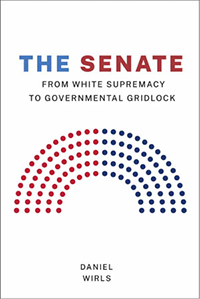 Professor Daniel Wirls published a new book The Senate: From White Supremacy to Government Gridlock (University of Virginia Press). The book examines the Senate in relation to our other institutions of government and the constitutional system as a whole, exposing the role of the "world’s greatest deliberative body" in undermining effective government and maintaining white supremacy in America. As Professor Wirls argues, from the founding era onward, the Senate constructed for itself an exceptional role in the American system of government that has no firm basis in the Constitution. This self-proclaimed exceptional status is part and parcel of the Senate’s problematic role in the governmental process over the past two centuries, a role shaped primarily by the combination of equal representation among states and the filibuster, which set up the Senate’s clash with modern democracy and effective government and has contributed to the contemporary underrepresentation of minority members. As he explains, the Senate’s architecture, self-conception, and resulting behavior distort rather than complement democratic governance and explain the current gridlock in Washington, D.C. Professor Wirls’ book was featured in the UCSC News.
Professor Daniel Wirls published a new book The Senate: From White Supremacy to Government Gridlock (University of Virginia Press). The book examines the Senate in relation to our other institutions of government and the constitutional system as a whole, exposing the role of the "world’s greatest deliberative body" in undermining effective government and maintaining white supremacy in America. As Professor Wirls argues, from the founding era onward, the Senate constructed for itself an exceptional role in the American system of government that has no firm basis in the Constitution. This self-proclaimed exceptional status is part and parcel of the Senate’s problematic role in the governmental process over the past two centuries, a role shaped primarily by the combination of equal representation among states and the filibuster, which set up the Senate’s clash with modern democracy and effective government and has contributed to the contemporary underrepresentation of minority members. As he explains, the Senate’s architecture, self-conception, and resulting behavior distort rather than complement democratic governance and explain the current gridlock in Washington, D.C. Professor Wirls’ book was featured in the UCSC News.
Psychology
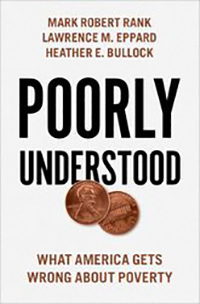 Professor Heather Bullock published Poorly Understood: What America Gets Wrong about Poverty (Oxford University Press). Poorly Understood is the first book to systematically address and confront many of the most widespread myths pertaining to poverty. It powerfully demonstrates that the realities of poverty are much different than the myths; in many ways, they are more disturbing. The first five sections of the book examine a wide range of poverty myths, including who is at risk of poverty, why poverty exists, the costs of poverty, issues surrounding the welfare system, and the wider topic of economic inequality. Poorly Understood not only challenges the myths of poverty and inequality but also explains in the sixth and final section why these myths continue to exist, as well as providing an innovative blueprint for how the nation can move forward to effectively alleviate American poverty.
Professor Heather Bullock published Poorly Understood: What America Gets Wrong about Poverty (Oxford University Press). Poorly Understood is the first book to systematically address and confront many of the most widespread myths pertaining to poverty. It powerfully demonstrates that the realities of poverty are much different than the myths; in many ways, they are more disturbing. The first five sections of the book examine a wide range of poverty myths, including who is at risk of poverty, why poverty exists, the costs of poverty, issues surrounding the welfare system, and the wider topic of economic inequality. Poorly Understood not only challenges the myths of poverty and inequality but also explains in the sixth and final section why these myths continue to exist, as well as providing an innovative blueprint for how the nation can move forward to effectively alleviate American poverty.
Professor Jean Fox Tree co-authored a paper with PhD Candidate in Psychology Allison Nguyen, along with Pranav Anand (Linguistics) and grad student Tom Roberts, entitled Look, dude: How hyperpartisan and non-hyperpartisan speech differ in online commentary, in the journal Discourse & Society. In their paper, authors discuss how hyperpartisan and non-hyperpartisan communication can be differentiated by the style of writing independent of the content of the communication. In a study of Reddit comments, hyperpartisan and non-hyperpartisan comments were differentiated by word choices and punctuation use. For example, there were more discourse markers (words like actually, you know, and gee), swear words, and exclamation marks in hyperpartisan comments.
Assistant Professor Saskias Casanova co-authored an article, Learning in the Counterspace of Not School in Educational Studies, with an interdisciplinary group of colleagues brought together by the Institute for Social Transformation’s New Gen Learning group. The co-authors included Education professor Cynthia Lewis, Psychology professor Margarita Azmitia, Psychology associate professor Rebecca Covarrubias, Sociology associate professor Rebecca London, two Psychology doctoral students, and one Education doctoral student. In the paper the authors describe the strengths of learning that minoritized students can draw from intergenerational familial settings. Using counterpaces, or sites that contest deficit narratives and affirm youth identities, and the personal intergenerational testimonies from the eight co-authors, the article offers a different perspective focused on the learning gained rather than lost for students remaining at home during the pandemic and suggests that educators forge more meaningful connections between familial and classroom knowledge to humanize learning.
 Distinguished Professor Campbell Leaper was interviewed for the Association for Psychological Science’s podcast, Under the Cortex. The title of the episode was Toys, Tots, and Gender. Professor Leaper discussed the gender stereotyping of toys and the impact on children’s development. He explained how play with particular toys provides opportunities to practice cognitive and social skills, and how gender-differentiated toy play can limit the development of these skills. Also, labeling certain toys as “for girls” or “for boys” contributes to the stigmatization of gender-nonconforming children. The podcast builds upon an interview with Professor Leaper in the Los Angeles Times regarding a new California law requiring gender-neutral toy aisles in large retail stores. An interview with Professor Leaper on this issue was also featured in the USCS News.
Distinguished Professor Campbell Leaper was interviewed for the Association for Psychological Science’s podcast, Under the Cortex. The title of the episode was Toys, Tots, and Gender. Professor Leaper discussed the gender stereotyping of toys and the impact on children’s development. He explained how play with particular toys provides opportunities to practice cognitive and social skills, and how gender-differentiated toy play can limit the development of these skills. Also, labeling certain toys as “for girls” or “for boys” contributes to the stigmatization of gender-nonconforming children. The podcast builds upon an interview with Professor Leaper in the Los Angeles Times regarding a new California law requiring gender-neutral toy aisles in large retail stores. An interview with Professor Leaper on this issue was also featured in the USCS News.
With UCSC doctoral student Brenda Gutierrez, Professor Leaper recently completed a new study entitled Reconstructing Culture: A Latent Profile Analysis of Mexican-Heritage Young Women’s Cultural Practices, Gender Values, and Ethnic Identity. This work is being published in Cultural Diversity and Ethnic Minority Psychology. Gutierrez and Leaper considered the diversity among Mexican-heritage undergraduate women in their gender ideologies, immersion in Mexican cultural practices, and ethnic identity. Contrary to some prior assertions that traditional gender values are inherent to Mexican culture, many Mexican-heritage women rejected traditional gender values while maintaining strong immersion in Mexican cultural practices and holding strong ethnic identities.
In Sexuality & Culture, Professor Leaper published another study with Brenda Gutierrez (and also collaborators at Cal State Long Beach) on Gender and Ethnic Variation in Emerging Adults’ Recalled Dating Socialization in Relation to Current Romantic Attitudes and Relationship Experiences. They investigated young adults’ current views about dating and romantic satisfaction in relation to recalled gender socialization experiences. Their findings suggest that family and peers in the context of ethnic background may influence the formation of sexual-romantic relationship attitudes.
Professor Su-hua Wang published the article Dismantling persistent deficit narratives about the language and literacy of culturally and linguistically minoritized children and youth: Counter-possibilities in Frontiers in Education with faculty and graduate student co-authors from the New Gen Learning research consortium. This article reviews research on language development and education that has had long-standing deficit perspectives of seeing children and students from underserved backgrounds as “lacking” certain key experiences or abilities to engage in sophisticated language development and language use at home and in school. The article clarifies the historical, ideological, and academic roots in why these deficit narratives have been so persistent in research and practice, provides conceptual critiques, and suggest ways to turn these deficit narratives around. Furthermore, it presents an area of research that exemplifies the assets-based approach to noticing the strengths that linguistically minoritized students bring to classroom.
Sociology
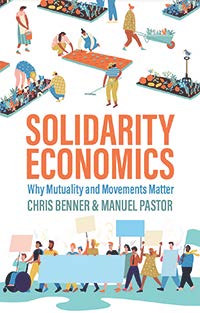 Professor Chris Benner and his co-author UCSC alumnus and former UCSC Professor Manuel Pastor published their book Solidarity Economics: Why Mutuality and Movements Matter. In this book they invite us to imagine and create a new sort of solidarity economics – an approach grounded in our instincts for connection and community – and in so doing, actually build a more robust, sustainable, and equitable economy. They argue that our current economy is already deeply dependent on mutuality, but that the inequality and fragmentation created by the status quo undermines this mutuality and with it our economic wellbeing. They outline the theoretical framing, policy agenda, and social movements we need to revive solidarity and apply it to whole societies. Solidarity Economics was featured in the UCSC News.
Professor Chris Benner and his co-author UCSC alumnus and former UCSC Professor Manuel Pastor published their book Solidarity Economics: Why Mutuality and Movements Matter. In this book they invite us to imagine and create a new sort of solidarity economics – an approach grounded in our instincts for connection and community – and in so doing, actually build a more robust, sustainable, and equitable economy. They argue that our current economy is already deeply dependent on mutuality, but that the inequality and fragmentation created by the status quo undermines this mutuality and with it our economic wellbeing. They outline the theoretical framing, policy agenda, and social movements we need to revive solidarity and apply it to whole societies. Solidarity Economics was featured in the UCSC News.
Assistant Professor Camilla Hawthorne edited The Black Mediterranean, a first-of-its-kind volume about race, Blackness, and the Mediterranean refugee crisis. Hawthorne and her coeditors are members of the Black Mediterranean Collective, an international coalition of scholars and thought-leaders across Italy, Portugal, Switzerland, the United Kingdom, Australia, and the United States. For this volume, Hawthorne contributed a chapter that focuses specifically on the racial politics of who and what can be considered “Italian,” revealing deeply problematic thinking about pathways to belonging. The book was featured in the UCSC News.
Assistant Professor Hawthorne also co-edited a special issue of Critical Ethnic Studies on the connections between border regimes around the world. Examining sites that range from US/Mexico, to the Mediterranean, to Palestine/Israel, and beyond, contributors move past superficial comparisons and think through the circulation of technologies, expertise, policing, and surveillance alongside the circulation of anti-colonial strategies via transnational social movements.
Finally, Assistant Professor Hawthorne was awarded the Leonardo Da Vinci Society Humanities Award for Early Career Researchers/Scholars. Established in 1949, the Leonardo DaVinci Society is a non-profit, non-political organization to promote a broader appreciation of Italian contributions to art, literature and culture.
Associate Professor Steve McKay published the article, Navigating Race: Intersectional Boundary-Making onboard Multi-national Ships in the journal Ethnic and Racial Studies. The article draws on research the author conducted onboard ocean-going merchant ships. Commercial ships are a unique context to examine race and migration, since they are globally mobile total institutions with a multi-national migrant workforce. The author sailed aboard three merchant vessels with mixed-nationality crews, focusing on how seafarers make sense of themselves and others. The article shows how national differences, segmented and gendered through the global labor market, also become racialized. In and through the ship’s spatial organization, the seafarers perform racialized forms of difference that heighten national and gender boundaries, often hardening them through the essentializing of cultural distinctiveness.
Associate Professor McKay also co-authored several publications from his local research on the affordable housing crisis in Santa Cruz County. No Place Like Home: Affordable Housing in Crisis, Santa Cruz County, CA—Final Report, co-authored with Professor of Sociology Miriam Greenberg, UCSC graduate student James Sirigotis and UCSC undergraduate student Thao Le was published by the UCSC Institute for Social Transformation. The report is the culmination of a three-year mixed-method, multimedia research project, conducted by faculty and students at the UC Santa Cruz, and their community-based partners, with the goal of understanding the affordable housing crisis and its lessons for the region and beyond. The research team surveyed tenants, interviewed a range of stakeholders, and researched historical trends and policy options. This report synthesizes the research in three main areas: the roots of the crisis, its ramifications for different populations and geographies, and potentially impactful political and policy responses.
A second publication from the research focuses on the unique research methodology, which integrated some 250 undergraduate students. The book chapter, “First Publics’ as Knowledge Producers: Integrating Students into Organic Public Sociology” is co-authored with Professors Miriam Greenberg, and Rebecca London and published in The Routledge International Handbook of Public Sociology. The chapter lays out the authors’ model of Community Initiated Student Engaged Research or CISER, demonstrating how they integrate undergraduates into public sociology. They draw on their multi-year local research project, No Place Like Home, outlining an extended model of organic public sociology that brings together three key groups of actors—undergraduate students, university researchers and community organizations/members—to collectively examine and address pressing social issues such as housing insecurity.
Assistant Professor Juan Pedroza co-authored a book chapter, “Death and Disabilities in Divergent Deportation Contexts: Revisiting the Hispanic Epidemiological Paradox Abstract,” in Migration and Mortality: Social Death, Dispossession, and Survival in the Americas (Temple University Press). In their chapter, Assistant Professor Pedroza and coauthor Pil Chung revisit the so-called "Hispanic epidemiological paradox" (HEP), which happens when immigrants with limited socioeconomic status report better health outcomes than US-born populations. They find that multiple disabilities are more common in metro areas with high deportation rates, but only among a select segment of the Hispanic population: noncitizens who arrived in the US as the era of mass deportations accelerated (after 2006). Recent arrivals are thus both at heightened risk of deportation as they remain a priority for removal and alone in reporting a higher likelihood of reporting multiple disabilities in metros with the most intense commitment to deportations. In their analyses, no other Hispanic groups were similarly at risk of heightened disabilities as captured by variation in deportation contexts. One of their conclusions is that in a rapidly polarizing time, commitments to finding and funding equitable health solutions remain limited, uneven, and sometimes unpopular.
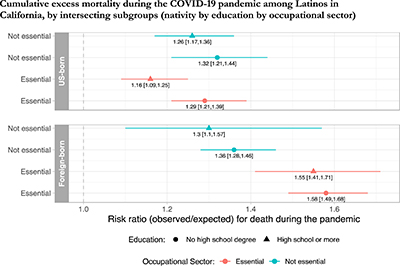 Assistant Professor Alicia Riley led a study published in Social Science & Medicine-Population Health titled, Excess mortality among Latino people in California during the COVID-19 pandemic. The study examined subgroup differences in excess death during the COVID-19 pandemic among Latinx people in California and highlighted the heightened mortality that occurred among Mexican-born and Central American-born Latinos in essential occupations in 2020.
Assistant Professor Alicia Riley led a study published in Social Science & Medicine-Population Health titled, Excess mortality among Latino people in California during the COVID-19 pandemic. The study examined subgroup differences in excess death during the COVID-19 pandemic among Latinx people in California and highlighted the heightened mortality that occurred among Mexican-born and Central American-born Latinos in essential occupations in 2020.
Assistant Professor Riley also co-authored a study published in Science Advances titled, Geographically targeted COVID-19 vaccination is more equitable and averts more deaths than age-based thresholds alone which used death certificate data from California and Minnesota to show that age-based COVID-19 vaccination strategies employed in early 2021 disproportionately benefited the non-Latinx white population.
In addition, Professor Riley co-authored Estimating the effects of Mexico to US migration on elevated depressive symptoms: evidence from pooled cross-national cohorts in Annals of Epidemiology, which found migration from Mexico to the U.S. was unrelated to depressive symptoms in a sample of over 18,000 Mexican-born older adults living in Mexico or the U.S.
Finally, Professor Riley's research on COVID-19 inequities was highlighted in an article in the Dallas Morning News and an article in the Santa Cruz Sentinel.
